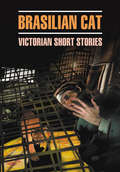
Чарльз Диккенс
Oliver Twist. Volume 1 of 3
“And will do everything you want, Bill, my dear,” interposed the Jew; “he can’t help himself, – that is if you only frighten him enough.”
“Frighten him!” echoed Sikes. “It’ll be no sham frightening, mind you. If there’s anything queer about him when we once get into the work, – in for a penny, in for a pound, – you won’t see him alive again, Fagin. Think of that before you send him. Mark my words,” said the robber, poising a heavy crowbar which he had drawn from under the bedstead.
“I’ve thought of it all,” said the Jew with energy. “I’ve – I’ve had my eye upon him, my dears, close – close. Once let him feel that he is one of us; once fill his mind with the idea that he has been a thief, and he’s ours, – ours for his life! Oho! It couldn’t have come about better!” The old man crossed his arms upon his breast, and, drawing his head and shoulders into a heap, literally hugged himself for joy.
“Ours!” said Sikes. “Yours, you mean.”
“Perhaps I do, my dear,” said the Jew with a shrill chuckle. “Mine, if you like, Bill.”
“And wot,” said Sikes, scowling fiercely on his agreeable friend, – “wot makes you take so much pains about one chalk-faced kid, when you know there are fifty boys snoozing about Common Garden every night, as you might pick and choose from?”
“Because they’re of no use to me, my dear,” replied the Jew with some confusion, “not worth the taking; for their looks convict ’em when they get into trouble, and I lose ’em all. With this boy properly managed, my dears, I could do what I couldn’t with twenty of them. Besides,” said the Jew, recovering his self-possession, “he has us now if he could only give us leg-bail again; and he must be in the same boat with us. Never mind how he came there, it’s quite enough for my power over him that he was in a robbery, that’s all I want. Now how much better this is than being obliged to put the poor leetle boy out of the way, which would be dangerous, and we should lose by it besides.”
“When is it to be done?” asked Nancy, stopping some turbulent exclamation on the part of Mr. Sikes, expressive of the disgust with which he received Fagin’s affectation of humanity.
“Ah, to be sure,” said the Jew, “when is it to be done, Bill?”
“I planned with Toby, the night arter to-morrow,” rejoined Sikes in a surly voice, “if he heard nothing from me to the contrairy.”
“Good,” said the Jew; “there’s no moon.”
“No,” rejoined Sikes.
“It’s all arranged about bringing off the swag,1 is it?” asked the Jew.
Sikes nodded.
“And about – ”
“Oh, ah, it’s all planned,” rejoined Sikes, interrupting him; “never mind particulars. You’d better bring the boy here to-morrow night; I shall get off the stones an hour arter day-break. Then you hold your tongue, and keep the melting-pot ready, and that’s all you’ll have to do.”
After some discussion, in which all three took an active part, it was decided that Nancy should repair to the Jew’s next evening when the night had set in, and bring Oliver away with her: Fagin craftily observing, that, if he evinced any disinclination to the task, he would be more willing to accompany the girl who had so recently interfered in his behalf, than anybody else. It was also solemnly arranged that poor Oliver should, for the purposes of the contemplated expedition, be unreservedly consigned to the care and custody of Mr. William Sikes; and further, that the said Sikes should deal with him as he thought fit, and should not be held responsible by the Jew for any mischance or evil that might befall the boy, or any punishment with which it might be necessary to visit him, it being understood that, to render the compact in this respect binding, any representations made by Mr. Sikes on his return should be required to be confirmed and corroborated, in all important particulars, by the testimony of flash Toby Crackit.
These preliminaries adjusted, Mr. Sikes proceeded to drink brandy at a furious rate, and to flourish the crowbar in an alarming manner, yelling forth at the same time most unmusical snatches of song, mingled with wild execrations. At length, in a fit of professional enthusiasm, he insisted upon producing his box of housebreaking tools, which he had no sooner stumbled in with, and opened for the purpose of explaining the nature and properties of the various implements it contained, and the peculiar beauties of their construction, than he fell over it upon the floor, and went to sleep where he fell.
“Good night, Nancy,” said the Jew, muffling himself up as before.
“Good night.”
Their eyes met, and the Jew scrutinised her narrowly. There was no flinching about the girl. She was as true and earnest in the matter as Toby Crackit himself could be.
The Jew again bade her good night, and, bestowing a sly kick upon the prostrate form of Mr. Sikes while her back was turned, groped down stairs.
“Always the way,” muttered the Jew to himself as he turned homewards. “The worst of these women is, that a very little thing serves to call up some long-forgotten feeling; and the best of them is, that it never lasts. Ha! ha! The man against the child, for a bag of gold!”
Beguiling the time with these pleasant reflections, Mr. Fagin wended his way through mud and mire to his gloomy abode, where the Dodger was sitting up, impatiently awaiting his return.
“Is Oliver a-bed? I want to speak to him,” was his first remark as they descended the stairs.
“Hours ago,” replied the Dodger, throwing open a door. “Here he is!”
The boy was lying fast asleep on a rude bed upon the floor: so pale with anxiety and sadness, and the closeness of his prison, that he looked like death; not death as it shows in shroud and coffin, but in the guise it wears when life has just departed; when a young and gentle spirit has but an instant fled to heaven, and the gross air of the world has not had time to breathe upon the changing dust it hallowed.
“Not now,” said the Jew, turning softly, away. “To-morrow. To-morrow.”






